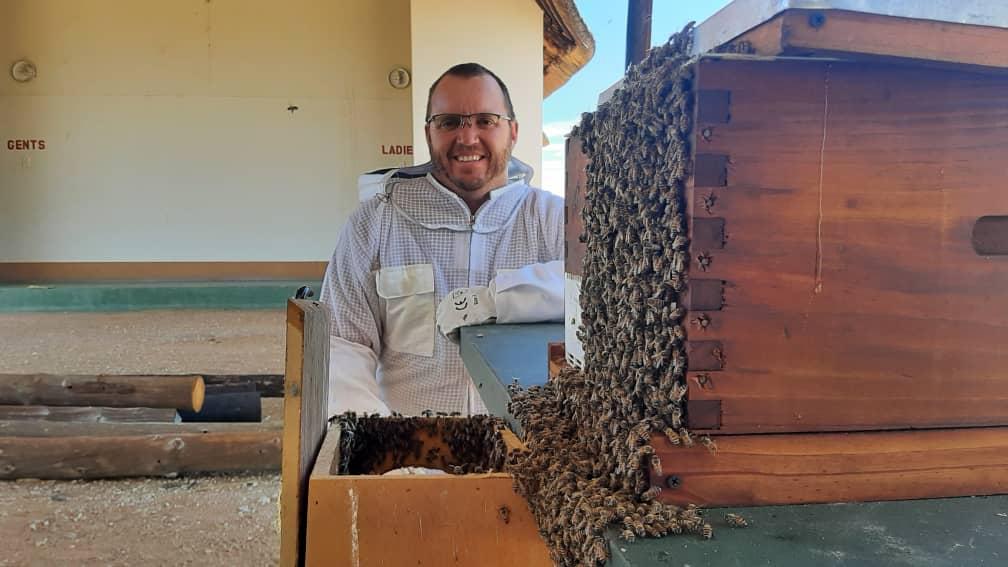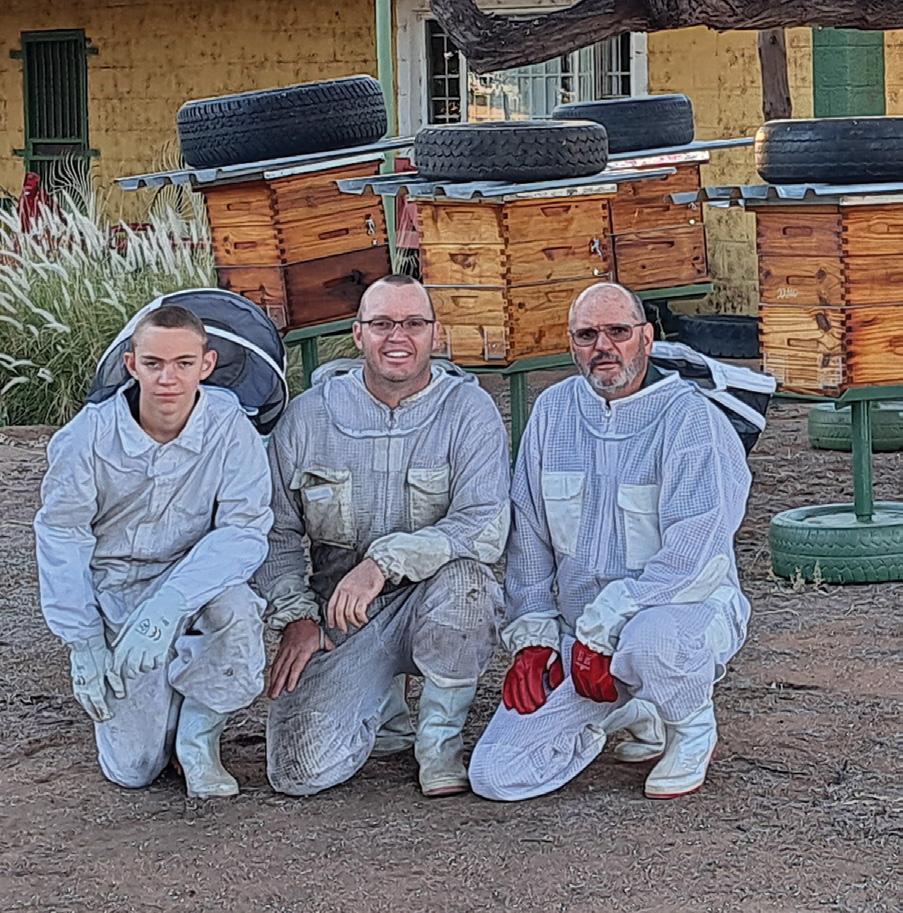
5 minute read
Buzzing to Success
Three Generations of Namibian Farmers Turn Award-Winning Beekeepers
Three generations of farmers, grandfather, father and son, took a beginners beekeeping course after a swarm of bees made a home on their farm. Starting with a single beehive, today they are international award winning Namibian honey farmers.
Kiep, Johan and Josua Lepen quickly learnt how bees are a critical species, responsible for 73% of all the world’s plant reproduction. Bees, and not just honey bees, are pollinators and pollinators are vital for food production and healthy and diverse ecosystems. Almost one out of every three bites of food we eat is because of a pollinator. We literally depend on bees for our survival.
In Namibia, with our dry ecosystem, bees are vital as they ensure the reproduction of vegetation in the natural environment. This includes vegetation that combats desertification as well as the unique fauna only found here. Bees can also boast being of the best environmental indicators, being a visible link to the health and wellbeing of our environment.
Despite our low levels of rainfall, Namibia has 342 bee species with 64 species that are unique to Namibia, and bees are found throughout the country.
The Lepen farm can be found in South Waterberg, in an area characterised as thorn tree savanna, where the bees source their nectar from the natural vegetation in the Waterberg Biosphere, which is fundamentally a dry deciduous forest. Here husband and wife, Johan and Liezl Lepen have beehives under a large Camelthorn tree in their yard.
The honey these bees are producing is exceptional, and has been recognised on an international platform at the world’s most prestigious honey competition. The National Honey Show is held in London, England and attracts beekeepers from all over the world to compete for the much coveted trophies. With more than 2400 entries, attendees include beekeepers from across the globe looking to celebrate the art and science of beekeeping.
According to Johan when he received the results of the competition, “the joy was overwhelming.” The category that Johan and Liezl’s honey was entered into had entries from 39 countries including Chile, South Africa and Oman. But it was the Lepen honey that took the second place position. “Our Namibian honey has achieved second place. I could not believe it, it felt so unreal” says Johan.
Gretchen Burmeister from the Beekeeping Association of Namibia, notes that this win is very important because it helps to put the spotlight on bees. As she explains, “Our lives depend on bees, and Namibia is not too dry for them.”
Bees are among the most fascinating creatures on our planet, mighty pollinators who play a critical role in supporting the health and abundance of our ecosystems and agricultural landscapes. As Johan explains, “what I have learnt in a short time has exceeded my wildest expectations. I learnt how bees live in harmony with each other and with nature. That they work together in a team and how each swarm has its own characteristics. I also learnt that they have a short lifespan that doesn’t slow them down as they apply themselves with agility and hard work.”

Gretchen adds that the apiculture industry in Namibia is in need of development. “There are no industry systems policies or protections here and this is why we need industry development with extreme urgency. As the driest sub-saharan African country, with frequent droughts and infrequent rainfall which directly influences sustainable agriculture practices and the economy, people in Namibia are not connecting the dots.”
The Beekeeping Association of Namibia with their mandate to develop the local industry, is hoping to change this. Gretchen shares that they are grateful for sponsors such as FNB Namibia who through their FirstRand Namibia Foundation hosted a honey-judging and tasting event in Namibia. It was from this event that the Beekeeping Association of Namibia encouraged the Lepens to submit an entry to the National Honey Show in England.

Gretchen explains that with local awareness and more sponsorship the Beekeeping Association of Namibia plans on completing a survey which will assist them in demonstrating how bees are needed for sustainable agriculture, and this in turn will help them to advocate for local market protections. Currently with support from the government, but with no budget allocated to their projects, they are fully reliant on the public and private sector support. Gretchen goes on to share that "in Namibia there is a need for collaborative efforts to pull any fractured pieces together. This is a specialised industry with a need for local experts, further knowledge and skills transfer.”
This situation is not unique to Namibia, Gretchen adds that “throughout SADC the apiculture industry is underdeveloped, and there is a need for collaborative efforts. While bees cross over political boundaries to bring life, we will now also do the same for them with SADC collaborative efforts planned for the future.”
With their holistic approach to pollinator protection, Gretchen explains that, “beekeepers are needed throughout Namibia, as they are the strongest advocates for all bees and pollinators.” She recommends that if you are interested in bees and beekeeping, that you start simply by going out into the field with a professional beekeeper. She explains that this will show you what beekeeping is all about and is a transformative and highly recommended experience.
While bees maintain and support life on earth, this team of avid bee supporters are helping to put bees and their plight into the realm of public awareness. Johan says that he hopes that more Namibians will join their cause and start their own beekeeping hives. He adds that “we should take good care of bees because they take good care of us.”
Kirsty Watermeyer

If you’re interested in beekeeping, or have any questions related to bees in Namibia, the Beekeeping Association of Namibia is happy to help. Find them via their website: www.beekeepingassociation.com.na or their email address: info@beekeepingassociation.com.na










